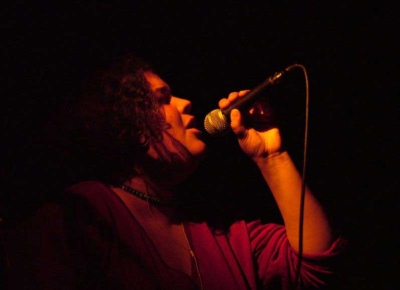Ridina Ahmedová

While there are many approaches to the art of singing, a singer also can choose the path of freedom: no lyrics, no instruments, not one style that should be followed. As the term singer seems to be limiting in this case, expression “voice artist” is used. The Prague based Ridina Ahmedová fits perfectly into this free style category.
Ridina Ahmedová was growing up in Oran, Algeria, in a mixed family. Her father was a black African from Sudan, her mother was Czech, her ancestors were Jews living as far as Kazakhstan and Novosibirsk. Her early influences were the muezzins’ calls for prayers, and American jazz from her father’s collection.
In past, she performed with a jazz project Floex (www.floex.cz, CD Pocustone, 2001), and also composed score for theatre performances. Now she prefers to sing acappella, using just her voice, which is partially looped, delayed and processed live on stage. Contrary to the fact a technical device is used, her performance is playful, warm and human. Her stage performance Voicescape premiered in 2004 was awarded as the best new project at the Czech Next wave awards. Ridina also leads vocal workshops.
In 2005 she finished her first album Hlasem (By Voice), containing 8 original songs and 2 cover versions, including Prague City lights by Vinx. She regularly performs all over Europe, in July 2007 she gave two performances and one workshop in Rudolstadt Festival in Germany. The renowned British music writer Ken Hunt reports:
“…nothing on her solo album Hlasem quite prepares you for witnessing her singing first-hand even if it slots all the components into place. The reality, however, trounced all expectations… First you see her recording a melodic fragment or a cadence-in-melody live. Played back through some electronic gubbins, it becomes a looped phrase against which she sings live. Before your eyes, so to speak. If that sounds complex, the reality isn’t. The art lies in turning theory into practice… As the full measure of what she was doing became clear, it was like peeling away layers of incredulity. Her take on Mongo Santamaria’s Afro-Blue may have been familiar melodically via John Coltrane (…) but sung countermelody live it took on a different dimension. Her voice is strong and flexible, in Czech terms like a youthful Ida Kelarová because of her power and expressiveness, though quite different stylistically. The comparison is high praise. Leading me to say unequivocally: Ridina Ahmedová is in a league of her own.”
“My music is not connected with words, I feel that is not necessary, but rather I see colours and images. Should I give you an example? This song has a dark red brick colour, and is about three groups of women standing on a village square, talking together and wearing colourful skirts, each one in a different colour,” says Ridina.
Past performances include:
Den Haag, TFF Rudolstadt, Vienna, Wroclaw, Jazzmeeting Berlin, Augsburg, Moscow.
In her advanced workshops she hosted:
Mahabub Khan (India)
Anita Daulne (ex-Zap Mama)
Nicole Casalonga (Corsica)
Wolfgang Saus (Germany)
Tellu Turkka (Finland-Suden Aika)
technical rider here
Read Ken Hunt’s article in fRoots, No. 297, March 2008, pdf or Word.
Ridina Ahmedová’s home page
Voice Workshop Proposals (for general public, conducted in French, English)
“SMALL WORKSHOP”
duration: approx. 60 minutes
audience: general
content: the basic information about
- the real time looping technique, building a multi-layered vocal textures
- the vocal techniques used
- the “inner awakening” workshops,
“THE INNER AWAKENING WORKSHOP”
duration: minimum 2 hours, optimum 4-5 hours in 1 or 2 parts
participants: 6 to 16 people, some vocal practice is useful but not necessary.
the goal: The human voice is a part of human self-expression, free of any pre-set esthetical rules.
First the students learn how to work breath, then “search for one’s voice”, which means creating a natural expression and then playing with rhythm and the possibilities of the voice.
The students take part in games and exercise individually or in pairs. Depending on their capabilities, the students can learn easy vocal compositions (like canons) or move to more complex polyphony pieces for 3 or more groups, eventually take part in improvisation.
Any participant is free to withdraw at any time and become an observer and join again later. Even if this is seldom used, it is important to declare this option in advance, as vocal expression is often inhibited by stage-fright and lack of self-confidence.
Contact:
Petr Doruzka
++420 244 464 205
click for email
Zeleny pruh 14
CZ-14700 Praha 4 / Czech Republic